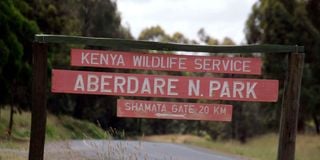State dealt blow in planned Sh4bn road project through Aberdare National Park

Signpost of Aberdare National Park.
What you need to know:
- Petitioners says the project will have a harmful environmental impact on Aberdare ecosystem.
- Justice James Olola asks Chief Justice Martha Koome to form an uneven bench to hear the case.
The Environment Court has extended orders issued in April stopping a plan by the Kenyan government to construct a road through the Aberdare National Park and Forest Reserve.
The East Africa Wildlife Society, Kenya Forest Working Group, Africa Centre for Peace and Human Rights and advocate Lempaa Suyianka want the court to stop the Sh4.4 billion project for ecological reasons.
The Kenya National Highways Authority (Kenha), Kenya Water Towers Agency, Norken International Limited and the National Environment Management Authority have been listed as respondents.
If the project is allowed, the petitioners argue, it will have harmful and irreversible environmental, economic, and cultural impacts on the Aberdare ecosystem.
Justice James Olola issued the order on Monday and asked Chief Justice Martha Koome to form an uneven bench to hear the case.
"The conservatory orders remain in force," he said after the hearing of suit failed to proceed as some of respondents had not filed and served their applications.
"I have considered the respondents’ application to be allowed more time to file and serve their applications," Justice Olola said.
Justice Olola gave the respondents 21 days to file and serve their applications.
Conservatory orders
On April 18, Lady Justice K. Bor had ordered that “a conservatory order is issued to preserve the Aberdare National Park and Aberdare forest by stopping the respondents or their agents from continuing the planned construction or any activity concerning construction o Mau Mau LOT 4: Ihithe-Ndunyu Njeru Road traversing the Aberdare National Park and Aberdare Forest pending inter partes hearing of the application" before the Environment and Land Court judge in Nyeri.
The Law Society of Kenya, National Museums of Kenya, Kenya Wildlife Service and Kenya Forest Service are named as interested parties.
On April 29, Justice Olola extended the conservatory orders granted on April 15 stopping construction of the road.
Justice Olola also directed that the proposed interested parties file and serve their respective applications upon all parties within seven days.
The respondents were given 10 days to respond to the petitioners' applications of March 22 as well as five days to serve applications as filed by the proposed interested parties.
On Monday, the petitioners led by lawyer Elizabeth Gitari, Amos Shihundu and Dudley Ochiel did not oppose more interested parties joining the case.
They were however concerned over delayed hearing and delays by respondents to file and serve their applications.
Planned construction
"The respondents are not taking the case seriously. We are asking the court to extend conservatory orders so that the park is protected while the court hears the petition," Mr Ochiel said.
Ms Gitari added: "The respondents appear hesitant to issue directions on record. I prefer we go ahead with the application. We are not opposed to giving of more time to the respondents to file their response to the main petition."
She said the petitioners had only received one application from proposed interested parties and prayed to the court for the case filed in February to proceed to the hearing.
Judge Olola questioned the respondents and proposed interested parties about their delays in filing and serving their applications for the case to proceed to the hearing.
The lobby groups moved to court to block the planned construction of the controversial 52km Mau-Mau Road, which cuts through the Aberdare National Park and Forest Reserve.
The petitioners said the construction of the road would imperil rare, endemic, and critically endangered animals and plants.
“The Aberdare is a critical water catchment for millions of people, livestock, and wildlife across Kenya. It supplies 80 percent of the water Nairobi City County uses through Sasumua and Ndakaini dams and generates 55 percent of Kenya’s hydroelectric power,” the petitioners stated.
Conservationists have opposed the construction of the Ihithe-Ndunyu Njeru Road and had called on Nema to reverse the decision granting a license for the upgrade of the highway.
Protected ecosystem
An appeal has been filed at the Environmental Tribunal in Nairobi contesting the same.
The lobby groups state that the road would endanger the lives of millions of people, livestock, and wildlife in Kenya dependent on the Aberdare for water.
Lawyer Amos Shihundu said the Aberdare is a protected and fragile ecosystem hosting rare and endemic besides critically endangered, endangered, vulnerable, threatened, and near threatened species per the International Union for Conservation of Nature (IUCN) Red List of threatened species.
“Besides, the Aberdare Mountain is on the tentative List of Unesco World Heritage sites as one of the most impressive landscapes of Eastern Africa with great scenic beauty. And for supporting important ecological processes within and beyond its catchment and hosting endemic and endangered species,” the lawyer submitted.
The petitioners fear that Kenha could begin to construct the road, a move that will have irreversible environmental and cultural impacts on the Aberdare ecosystem.
They want the court to decide whether the risk of extinction of at least four species in the Aberdare (like the Mountain Bongo) and other issues in the case are substantial questions of law and should be certified for hearing by a bench of five or seven judges appointed by the Chief Justice.
It is their argument that the road construction starkly neglects due consideration of five alternative routes, each offering a significantly diminished environmental footprint, cost implications, and adherence to imperatives such as adaptive management, wildlife corridors, climate resilience, preservation of cultural heritage, and necessitating fewer mitigation measures.
“Additionally, the road threatens the cultural heritage sites of considerable significance to local communities and the national historical landscape, potentially resulting in their irreversible destruction,” the conservationists said.





